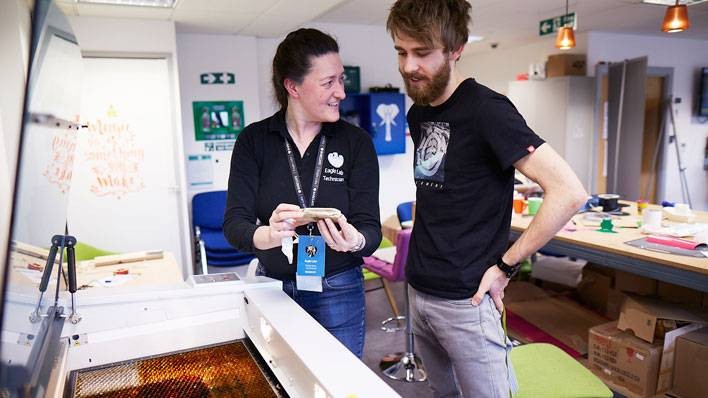
Jobs for life
From ‘self-serve’ jobseeker tools to ‘internal headhunting’, we look at how a push for career mobility within Barclays is putting a new spin on the idea of a job for life.
“My career changes have sometimes led to me thinking ‘what am I doing here?’” jokes Caroline Graham, who is currently a Director leading a large regulatory change programme within Barclays Investment Bank. Graham’s career path has often taken surprising turns, but can be taken as typical in a landscape where a ‘job for life’ – even if it’s in the same company – rarely means staying in the same department or sector.
Graham joined Barclays in 2007 to manage global payments projects, following an early career in PR and the founding of her own tech marketing agency. She moved to her current role after three years leading operations change projects in Mumbai and Chennai.
“I was always looking to get skills that could further my career strategically,” Graham says, “so I went to India, and as well as the job opportunity I knew that I’d meet all the main players in the bank because they’d all at some stage come out there.”
Graham has forged a career dealing with structural alterations to the bank rather than changes to individuals’ careers, but as a manager she has a perspective on the importance of mobility for her colleagues: “You don’t want to lose good people from your team, but you want to provide them with opportunities, and need to understand it’s for their benefit. Projects end and line managers can find roles for colleagues within the bank, or similarly if they themselves have a role available they can use their own team to push out to their own contacts to help recruit internally.”
You don’t want to lose good people from your team, but you want to provide them with opportunities, and need to understand it’s for their benefit.
Barclays Investment Bank
Attempting to remove friction from this process, Sarah-Jane Walker leads a team focused on internal mobility across Barclays’ retail, investment and corporate banks. “Internal mobility has become a larger priority for us,” says Walker. “The bank’s executive committee recognised that we were losing a lot of people and asked whether we can really say that we’re doing everything we can to find them a new job.”
The internal headhunt
With the official title of Head of Customer Experience for Global Resourcing and Graduates, Walker points to exit surveys of departing staff, as well as interactions on careers sites LinkedIn and Glassdoor, to conclude: “One reason people were leaving us was a perceived lack of career opportunities. Yet there are a lot of opportunities available, so the real problem was that people just didn’t know where to start. If your line manager doesn’t have a good network, that can restrict what your career can be like. We put together a working group across all business areas to create some solutions and help people have more foresight of opportunities and move around Barclays more easily.”
Walker says that much of this innovation bypasses line managers and materialises online, with the development of new tools allowing Barclays to, in her words, “internally headhunt” by matching vacancies to colleagues’ skills. Walker says: “Those interventions encourage people to try something new, because often it’s a job they can do but it’s in a different business area or has a job title that scares them off. And we’ve had huge successes doing this – there’s a much better quality of candidate coming through.”
“We’re also trying to make a lot more things ‘self-serve’, so everything is easy to find and intuitive and helpful. And it’s important to be mobile-friendly so that everyone can access the tools to support their career development on their own devices.”
Security with variety
Walker talks of promoting a “cultural shift” within Barclays, where people are excited about looking to move to different roles within the bank. She says that the bank’s internal mobility rate (the percentage of all hires that come from within) rose from 38% to 50% in 2016. Walker observes that “internal mobility is more talked about now than it’s ever been, and from my experience speaking at seminars and conferences I can see we’re ahead of many organisations already in our approach and the recognition of how important internal mobility is for our workforce.”
“You can have a career with Barclays that’s similar to working for a lot of smaller companies under the umbrella of a larger company,” says Walker. Through the bank’s career channels, it’s her job to push out “so many case studies at all levels” that provide examples of a new career path that can provide “security with variety”.
One reason people were leaving us was a perceived lack of career opportunities. Yet there are a lot of opportunities available, so the real problem was that people just didn’t know where to start. We put together a working group across all business areas to create some solutions and help people have more foresight of opportunities and move around Barclays more easily.
Head of Customer Experience for Global Resourcing and Graduates

Sharon Jones is in an Eagle Lab technician in Bournemouth
Many of these case studies provide tips for the next move. “Barclays is an immense organisation,” says one, “and the majority of people are very willing to sit and tell you more about what they do. Relationship building is key to internal mobility.” This echoes a tip from Caroline Graham: “Networks can give you more insights about what’s there than jobs boards.” And Sarah-Jane Walker, when working with graduates and “early careers” colleagues, sees people who are “a lot more clued up and have more confidence to network and know they have to go out and make good contacts to move around.”
Internal mobility will come naturally to that generation, thinks Walker: “I ask them: ‘Why Barclays?’ Yes, some point to the salary, but many talk about the global opportunities and the fact that you can rotate. We’re saying to them, ‘we want to invest in you but we want to challenge you’. If someone wants to stay in the same job for 30 years, that’s fine, but generally we evolve and you have to be bit more fearless and look for different things – and if we want to retain our talent we need to enable that.”
“With larger organisations, one of the biggest contributors to people feeling stress in their career or thinking they can’t find any way out is that they can’t find the information. It’s our responsibility to make things accessible and share our strategy and ultimately enable them to have a great career with Barclays,” says Walker. Whether that’s Caroline Graham networking her way from software via India to leading on regulatory projects, or Sharon Jones inspired by a careers fair app to move from PPI Advocacy to Eagle Labs, there’s no shortage of examples where this strategy is allowing Barclays colleagues to pursue career variety and gain a new type of job for life.
Sharon Jones: Eagle Lab technician – Bournemouth
After 19 years as a primary school teacher, Sharon Jones joined Barclays in 2014 in a temporary position, dealing with customers’ PPI claims. She is now the Lab Technician at Barclays’ Bournemouth Eagle Lab.
“What I discovered when I arrived at Barclays was a place where I was supported and encouraged to develop new skills. There was a big community that was engaged not just with the company but with the wider world, so as well as my day job I was able to get involved in fundraising activities and with Digital Eagles. There were lots of opportunities available even for a temporary member of staff.
“As my six-month contract ended, I was encouraged to apply for a promotion and become a subject matter expert within the advocacy team. That allowed me to use transferable skills from teaching and be highly involved in supporting and training teams. As new people walked through the door like I’d done, I became involved and a lot of the temps that I trained are still with the bank two-and-a-half years later doing new and interesting things.
“Alongside this I was involved in Digital Eagles, setting up a regular Code Playground in Poole. I was completely supported in community activities and developing my knowledge. I learnt to code Scratch, Python, HTML, CSS and Java – there was a rapid learning curve mentoring young coders. I found colleagues in Poole with coding skills – we have a great hotbed of sharable knowledge - and in learning on the job got to the point where I built an app that was used for a careers fair.
“What I discovered through building the app was the number of roles available even in my small location. So instead of feeling stuck if you worked in customer services or PPI and only saw your promotion prospects within that sector, you could see how your skills or interests would transfer.
“Because of my experience with Digital Eagles, I was given the opportunity to help set up the Bournemouth Eagle Lab. I’m now the Lab technician and it is the most incredible job. But it’s not where I’m stopping. I’m interested in seeing how what I’ve learnt can help set up more of these centres, and I’ve been given the opportunity to get involved in national initiatives. I couldn’t honestly tell you where I’m going to be in a year’s time, other than I’m 99.9% sure it’ll be within Barclays.”